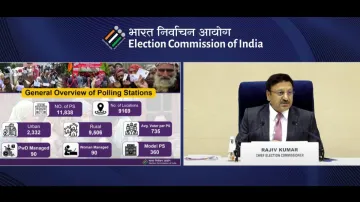Assembly Elections 2024: While announcing the dates for Assembly elections in Jammu and Kashmir, Chief Election Commissioner Rajiv Kumar penned a heartwarming note, lauding the progress made in the Lok Sabha elections and expressing hope for higher voter turnout, more woman and youth participation and vibrant polling stations.
"We have established every dimension of democracy in every layer where it is possible. We are preparing to build on the foundations set in the 2024 Lok Sabha elections. I wrote a few lines that I want to dedicate to the youth of J-K. 'Lambi kataaron me chhupi hai badalte surat-e-haal, yaani jamhooriyat ki kahani, roshan ummedein ab khud karengi goya apni taqdeer-e-bayani, jamhooriyat ke jashn me aapki shirkast, jamuriyat ke jashn me aapki shirkat, duniya dekhegi naapak iraadon ke shikast ki kahani," he said.
Notably, the Jammu and Kashmir Assembly polls will be held in three phases on September 18, 25 and October 1. The counting of votes will be done on October 4. Haryana will go to the polls on October 1 and the results will be declared on the same date as J-K.
"There are a total of 90 Assembly constituencies in J-K, of which 74 are general, ST are 9 and SC constituencies are 7. Talking about the electors data, total 87.09 lakh electors are there is Jammu and Kashmir, 44.46 lakh male voters and 42.62 lakhs female voters are there. There are over 20 lakh youth voters. There will be 11,838 polling stations at 9,169 locations," Rajiv Kumar said.
According to the Election Commission of India, Jammu and Kashmir saw an exceptional response to the democratic process in the Lok Sabha Elections with a three-decade-high voter turnout of 58.58 per cent. "Most heartening were the visuals of long queues of young, old, women voters waiting patiently to exercise their franchise," Kumar said.
Additionally, the disputed region saw peaceful polling and no repolls. A comprehensive assessment of the security situation in J-K has been conducted so that people will be able to vote in the first Assembly elections of the region since the abrogation of Article 370 on August 5, 2019.
Following a delimitation exercise, the number of Assembly seats has gone up from 83 to 90, excluding those allocated to Pakistan-occupied Kashmir. Jammu and Kashmir will witness elections after a gap of ten years as the last assembly election was held in 2014. The PDP-BJP coalition government fell in June 2018 when the latter withdrew support to the then-Chief Minister, Mehbooba Mufti.
"We recently visited Jammu & Kashmir and Haryana to take stock of the election preparation in these places. A great enthusiasm was seen among the people. They wanted to participate in the election process. People want elections to be conducted there as early as possible...The long queues at the polling booth in J&K during the Lok Sabha elections are proof that people not only want change but also want to raise their voices by becoming a part of that change. This glimpse of hope and democracy shows that the people want to change the picture. They want to write their own destiny. The people of Jammu and Kashmir chose ballot over bullet in Lok Sabha elections," said Rajiv Kumar.
Meanwhile, Haryana will go for Assembly Elections on October 1. "Total electors in Haryana are 2.01 crore, including 10,321 centenarians", CEC Rajiv Kumar added. There will be 20,629 polling stations at around 10,500 locations. There will be polling stations in the housing societies in Gurgaon, Faridabad and Sonipat.
ALSO READ | Assembly Elections: J-K to go to polls in three phases, Haryana in one, results on Oct 4 | DETAILS
ALSO READ | What happened in 2014 Jammu and Kashmir Assembly Elections? Know poll result
Latest India News
